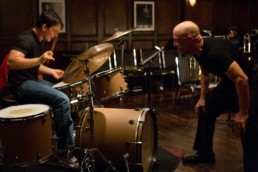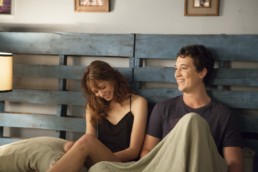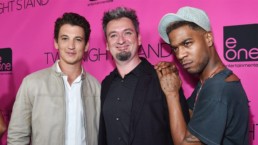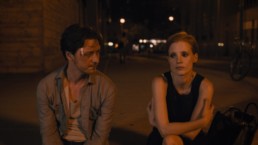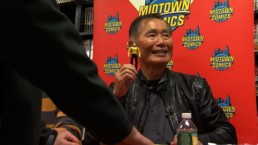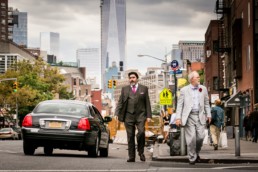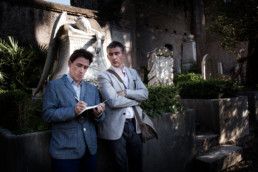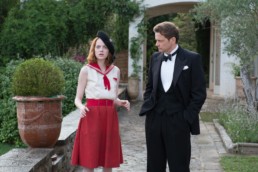Whiplash
As films about music and musicians go, largely split between being dramatic biopics of a naive star navigating the turbulent waters of the industry itself or all-out pop-heavy musical celebrations, most have revered 'music' and regarded it in its most magisterial of ways. Characters' all-consuming torment or glee is typically played against its beautiful, romantic, and purified sonic elements to elevate the bigger, surrounding drama. It might be safe to say, however, that these filmmakers didn't play in the same demanding high-school music orchestra that second-time feature film director Damien Chazelle did. And what he learned there, was that music is nothing near related to "being safe."
A former jazz student drummer himself, Chazelle writes and directs the heart-pounding semi-autobiographical film, Whiplash (this year's Sundance Grand Prize Jury winner, the festival's highest award), about a similarly dedicated undergrad musician, whose discovery by the school's eccentric, if not outright hostile jazz ensemble instructor at the school's East coast music conservatory leads to a relentless obsession that pushes the boundaries of how far one will go, and how much one will endure, to achieve greatness. Chazelle, in a Director's Statement about the film, says, "There are a lot of movies about the joy of music. But as a young drummer in a conservatory high school jazz orchestra, the emotion I felt the most frequently was a different one: fear. Fear of missing a beat. Fear of losing tempo. Most overwhelmingly, fear of my conductor."
Check out our interview coverage with Miles Teller, J.K. Simmons, and Damien Chazelle, on Whiplash
From a voided black splash, our first sensory cue is the lone, echoing build of a snare drum. A single hit, like a gunshot, followed by another, and then by another, in ever-quickening measurement, culminates in a drum roll that sees jazz drummer Andrew (Miles Teller) playing in the school's practice room. As an ominous ghostly presence in slim-fitting all-black wears, Terence Fletcher (J.K. Simmons), head cue-balled, arms toned, and eyes unwavering, immediately barks drum beats for Andrew to play back perfectly. The mechanics of this scene alone, and serving as the film's opening, set the tension-filled operatic stage that is doomed to meet tormenting and self-sacrificing proportions.
From there, it's a film ablaze, where the next day Andrew is singularly plucked from being an "alternate," turning the sheet music pages for the "core" drummer and transferred into Terence's distinguished performance jazz ensemble as the lead drummer. Inspired and drawn in by Terence's initial warm-heartedness, Andrew finds that his too-good-to-be-true opportunity proves to be just that; in a dizzyingly-instant moment, he is blind-sighted by his instructor's immediate trial-by-fire teaching method, by way of hurling a drum-cymbal at his just-off-tempo drummer's head. Scenes of Terence spitting venom at his newly petrified protege take on ever-increasing suspense and tension, as head-spinning camera whip-pans and quick-cut editing nearly overwhelm and suffocate the audience's senses, a hypnotic and consuming experience of sweat, blood, tears, and paranoia.
I can say with total confidence that you won't see another movie so directorially confident from any other first time director this year.
The fast-rising Teller, whose earlier and smaller star-making billings (The Spectacular Now) are quickly getting replaced with bigger studio projects (his 'Mr. Fantastic' in Marvel's The Fantastic Four reboot is slated to come out next year) is able to show off his most sincere and honest acting chops, as well as a further dedication to the craft with this demanding role that sees him trading his cool guy charisma with a more reserved, laser-focused determination, with solemn inner-willing of wanting to be the next Charlie Parker, to be the best jazz drummer ever. Teller further impresses in this role that sees his character's incredible journey and range, from seething frustration, weeping angst, and a physical embodiment complete with bloodied raw hands and sweat-pouring exhaustion, bringing his real-life drumming experience to perform the film's incredible musical numbers himself.
However, the meat of the movie is in the crucially necessary performance needed from Simmons, who more than rises to this occasion. His comically gruff groucho persona wades deep into the thickness of vitriol-laced contempt for all who dare defy his expectations, making him the most transfixing and fear-making element of the movie.
Visually, and at its very best, Whiplash takes the eery yellowed and greened colors and ominously foreboding camerawork reminiscent of The Social Network, mixed with two heavy parts paranoia and obsession, served neatly as a devilish and spiraling-mad cocktail. How many more ways do I have to say, just go see this movie already?
Whiplash should be further praised for being the gripping and original screenplay that it is, which Chazelle and company shot in a brisk nineteen days. This breakneck shooting schedule is successfully felt onscreen, with a rushed momentum that propels the movie forward, creating and heightening stakes in its second and third acts, and resulting in an all-out blitzkrieg of movie endings in one of the most cathartic of grand finales, taking place in Carnegie Hall. I can say with total confidence that you won't see another movie so directorially confident from any other first second time director this year. Chazelle's Whiplash, like the art of drumming, delivers precise and hard hits, moving from quieter moments of stolen vulnerability to blistering and primal rampage. And when it's over, all you'll hear is the silent echo of what you will still be wondering was controlled chaos, and what was not.
'Whiplash' is in theaters this Friday.
*Update: An earlier version of this review incorrectly listed Whiplash as being Damien Chazelle's first feature film. It is his second.
https://www.youtube.com/watch?v=7d_jQycdQGo
Review: 'Two Night Stand'
For this generation of hip young Millenials- whose philosophic outlook on life stems from an ever-non-bothered, life-is-good mentality, it certainly sucks when events outside of their control force them to acknowledge worldly inconveniences, and god forbid- awkwardness, with their contemporary counterparts.
This cultural awareness of today’s internet generation, in story, tone, and sex-driven humor, is nailed down exactly and casually, in the new soft-“R” rated romantic comedy, Two Night Stand. Starring fresh-faced up-and-comers Miles Teller (The Spectacular Now) and Analeigh Tipton (Crazy, Stupid, Love), Two Night Stand tells the story of Megan (Tipton) and Alec (Teller), who, after a night’s hook-up (initiated by a determined Megan by way of an online dating website looking for a night of meaningless sex- you know, to clear the head), find that an overnight snow storm has blocked the apartment’s front door exit, forcing them to spend an unplanned second day together.
There is quite a lot to like in this movie- it being manageably made with a finger on the pulse of this new turn of the century adult-kid culture, addressing how these new young adults are meeting existential crises and trying to make sense of new found larger-world consequences- but first, a bong toke (you know, to clear the head). At least that’s Alec’s decision-making, as he and Megan, having started the next morning off on the wrong foot, are forced to lazily pass the time. There’s also a dance party, ping-pong, and an elaborate snow storm-braving rescue mission to retrieve a neighbor’s plunger. And in a bigger series of events, Megan and Alec, with their detached-intelligence professed to override their emotional viewpoints, land on the idea that, since they obviously will never see each other again after this terrible time together, to use the forced shut-in to give some “pointers” to the other, so that they’ll at least improve their "skills" for their next partners. Of course, casual sex never lends itself to a clean break, which leads to further unexpected consequences.
There is quite a lot to like in this movie- it being manage-ably made with a finger on the pulse of this new turn of the century adult-kid culture, addressing how these new young adults are meeting existential crises and trying to make sense of new found larger-world consequences- but first, a bong-toke (you know, to clear the head).
On the whole, the film works, getting by on good consistent fun from the mix of all its parts. Screenwriter Mark Hammer writes a fresh story here that this 23-year-old found entirely non-cringeworthy (a high compliment), even if it felt a bit more mechanical than an episode of Girls might. First-time feature-film director Max Nichols, who, in our exclusive interview, said to “worship at the alter of John Hughes,” balances the characters' headstrong confidence with their deeper and more guarded insecurities, as the Breakfast Club auteur so magically did (as well as his father Mike Nichols with The Graduate). And of course, the presence of Tipton and Teller, who, at this point have already accumulated impressive and sizable projects under their belts, are so naturally and effortlessly charming. Teller, with his cool-guy quippiness, and Tipton, with her truly unique brand of comic delivery (think a few points bubblier than Aubrey Plaza) are fun-to-watch actors, whose shared chemistry alone is enough to drive the movie forward.
While the film has its detractors, with its messy third act, and even in the finer particulars of the characters themselves (It’s hard to believe Megan was engaged for four years throughout Medical school but really only wanted to be a homemaker for her fiancé, and Alec being a simple dude who just “works at a bank,”) stand out as mental hang-ups that seem to peskily linger in the back of our minds. There are some further plot-driven events that move the story along at the exception of a few eye-rolls, and a bit more chaos ensuing in the prison-by-apartment scenario would have been fun to watch. But this is not that movie. This movie is a non-offending, charming, young-adult romantic comedy, that qualifies much more as serviceable date movie than generation-defining film. An of-the-moment soundtrack, led by hits from psychedelic electronica band STRFCKR (pronounced with its missing vowels) provides an upbeat and trendy backdrop for the New York love story to take place in.
https://www.youtube.com/watch?v=VcSosCe0B-A
Max Nichols on 'Two Night Stand'
This writer will go out on a limb and say that, since this first-time feature film director is still working to make his name known to movie audiences at large, that most introductory paragraphs profiling the director will cut right to the part about his father being Max Nichols, director of the seminal 60's classic on the confusion of young adulthood, The Graduate. Even further, any number of write-ups probably make the next logical step in comparing this director's first film, about recently graduated millennials navigating the new-age waters of hook-up land, again, to the Dustin Hoffman classic. And while all of the above statements are entirely true, it's not all entirely accurate, in getting to know Max Nichols. A self-professed metal-head loving music video director, I recently spoke with the forty one year-old father, who, in a phone interview, relayed nothing but humorous and thoughtful conversation, honest self-reflection, and effortless cool. Max Nichols, delivering his first big-budget (or more accurately, bigger budget) film, talked about youth culture, his earliest film-viewing and on-set experiences, and what he learned to be extremely careful of when reading future scripts. We begin:
HI MAX, MR. NICHOLS. HOW ARE YOU DOING?
…I’m going to apologize in advance for the rambunctious toddlers in the background…
TWO NIGHT STAND OPENS IN THEATERS THIS FRIDAY- HOW HAS THIS JOURNEY BEEN FOR YOU?
It’s been thrilling every step of the way. I read so many scripts before coming across one that made me think, "Oh man, I gotta do this movie," which is exactly how I felt the moment I read Mark Hammer’s Two Night Stand. From that auspicious beginning, to meeting Analeigh (Tipton) and Miles (Teller), and winding up with this incredible cast and amazing crew, at the risk of sounding a little corny- it’s been a dream come true.
WHAT WAS THE FIRST FILM YOU SAW THAT TRULY AFFECTED YOU ON A DIRECTING LEVEL, THAT MADE YOU THINK, 'I WANT TO DO THAT'?
Probably The Breakfast Club. I was at the perfect age when that movie came out, in that I was a little bit younger than the characters but old enough to have an appreciation of how unprecedented the honest depiction of what it’s like to be that age. It just seemed completely different than any movie I had ever seen before.
Obviously I worship at the alter of John Hughes now, but at the time I was like "This guy gets it!" To provide this word of teenager-dom that I was so fascinated by- it was like John Hughes was some sort of wizard.
WHAT WAS YOUR FIRST EXPERIENCE LIKE BEING ON A SET? I KNOW YOU STARTED OUT WORKING IN THE MUSIC VIDEO WORLD.
Well my dad is a director, so I’ve spent a fair amount of time on set with him when I was a kid, including when I was just a little baby. So we'd probably have to turn to another source for a good anecdote about my very first experience on set...
One early set memory that I have, and it's certainly not a particularly elevated one from a "cinema" standpoint, was, I remember being on set with my dad in Texas, while he was shooting Silkwood. And I couldn't believe that there was a whole truck parked there, that could make you a cheeseburger anytime you want, and that you could have as many cheeseburgers as you wanted in any given day. And then there was a whole other place where there was just a whole stack of candy that you could just go take. I mean, more than anything, that probably told me, "This is where I need to work."
Honestly, it felt like an opportunity to bring my friends, or at least maybe younger versions of my friends, to life on the screen in a way that, at least it didn't seem to me, was happening at the moment.
WHAT WAS YOUR FIRST DIRECTING EXPERIENCE? DID YOU MAKE IT A POINT TO HAVE THE SAME CRAFT SERVICES YOU REMEMBERED SEEING AS A KID?
[Laughter] Oh man, if only that had been possible!
The first video I directed was, and I had worked in the music business a little bit when I was younger, so I'd been on set with other music videos, but the first music video I directed was for a fantastic band named American Minor. Just like a great, contemporary classic rock band, if there is such a thing. And they had this great song called "Buffalo Creek," and we shot it in this basement in this hideous, disgusting basement in LA, that I've since been told many times has been used for pretty much every other either gore or porn movie out there, but we put it to other use that day.
And no, I mean, as far as microscopic budget, I think maybe one pizza, or a couple Subway subs for the whole crew to share at lunch time. And since all we could afford was to have the band perform, I think they performed for about thirteen hours straight. I hadn't quite properly factored in the toll that would take on them, and when we were done I was like, "Cool man, you guys wanna go out and get some drinks?" And I think they pretty much collectively collapsed.
DID YOU FIND THAT BEING THE SON OF A LEGENDARY FILM DIRECTOR HELPED OR HINDERED YOUR OWN BURGEONING CAREER AS A DIRECTOR WHEN FIRST STARTING OUT?
Um, I don't know? I came to directing through this music video world where it was sort of, you know, maybe a thing that people knew, or maybe they didn't? But it didn't seem to have sort of a tremendous cache in that world, because it primarily came down to, "Well, who else have you done videos for? What do they look like? Were they hits?" So I think it was nice for me to have an opportunity, through the many twists and turns that life takes, for me to spend a long time working in that realm, and have an opportunity to develop some, what I hope is at least a little bit of skill and talent as a director, before turning to a feature. Maybe it made the whole thing a little less loaded for me, than it might have been otherwise.
RETURNING TO TWO NIGHT STAND, ABOUT TWO YOUNG COLLEGE GRADS WHO ARE AWKWARDLY SNOWED IN TOGETHER AFTER A ONE-NIGHT FLING… THE FILM SO HEAVILY RELIES ON THESE YOUNG ACTORS' CHARM AND PERFORMANCES, AS WE'RE PRETTY MUCH TRAPPED IN THE SAME ROOM WITH THEM FOR THE ENTIRETY OF THE MOVIE. WHAT WERE YOU EXCITED TO BRING TO THE SCREEN AFTER READING THIS SCRIPT?
One of the things that I was sort of most drawn to, in that regard was, the voice that Mark Hammer wrote and captured for Megan (Tipton). It just rang like, head and shoulders above so many other young female characters that I read as authentic, and was so evocative of so many smart, funny, sarcastic young women that I know.
Honestly, it felt like an opportunity to bring my friends, or at least maybe younger versions of my friends, to life on the screen in a way that, at least it didn't seem to me, was happening at the moment. And that when it came to Miles and Analeigh embodying those characters...there was something particularly when I first met Analeigh. She just seemed so singular, and distinct to me, and was sort of unlike any particular human I had met before, in this wonderful way that, I knew that if I felt that way over her, that people would buy having such a powerful reaction to her in their short time together. And I felt that audiences would feel really drawn to her in the short time that they spent with the characters as well. And I'm lucky to say that, at least so far, that's been the case.
THIS BEING YOUR FIRST FEATURE FILM, WHAT ARE YOU ULTIMATELY WALKING AWAY WITH, AND HAVING LEARNED AFTER MAKING THIS FILM?
I think coming off this movie in particular, I have learned to be very, very careful should I ever encounter the word "snow" or "ping-pong" in a script again, for completely different reasons. Both are almost impossible to re-create in a scene. I realize now that it is extremely easy to write: "Megan and Alec play ping-pong." Shooting and covering a scene where Megan and Alec play ping-pong, with anything resembling continuity...if there's a director out there effortlessly, my hat is off to 'em.
Review: 'The Disappearance of Eleanor Rigby: Them'
Although there is a unique, conceptually ambitious movie that exists in first-time writer/director Ned Benson's The Disappearance of Eleanor Rigby: Them, the audience, unfortunately, probably wouldn't know it, after seeing this re-cut version of his film(s).
Initially conceived as a more "experimental" movie-watching experience, the original vision for Rigby was for audiences to watch two films, a sort-of double feature that followed the same story but told from the differing perspectives of its male and female lead characters, and affixed with the respective titles, Him and Her.
This original vision played at last year's TIFF, and was bought and sold to The Weinstein Company. Now, eight months later, Benson and Harvey "Scissorhands" (infamous for re-editing acquired films so as to perform better theatrically) have combined both versions, Him and Her, to create this third version, : Them. However, the result in denying audiences the two-film experience, and doing away with the filmmakers' exploratory attempt to create a third, more powerful synergistic effect, does not work for this film- the takeaway is one of non-satisfaction, as the film fails to successfully mine the focused riches that either singular film might have offered in their own right (Read Jasper's review of The Disappearance of Eleanor Rigby: Her/Him, here).
At its best, the film reveals an authenticity about the human condition, and our search for reason and meaning in a world that may offer none; at its worst, it reveals that it might just be the film itself that suffers from its own existential crisis.
The story of a broken marriage at the hands of a family tragedy, the film stars Jessica Chastain and James McAvoy, with her as the titular character. It should be said early that the title while lending itself to hints of mystery, or perhaps Beatles-referencing, is loyal to neither, and only serves as being an intriguing title for an art house film. The film, at just over two hours long, is a free-flowing collection of scenes intimate, fragile, and most impressively, honest, about how family and lovers take to dealing with such new heartbreaking territory. Benson crafts each scene to hold such emotional weight and authenticity that the whole thing feels massively charged with real life understanding and empathy in a way that only skilled filmmakers and actors could achieve. Similar in nature to the dark drama Rabbit Hole, also about a couple dealing with the tragic loss of an infant child, Rigby: Them follows each estranged spouse as they try to figure out how to go on and make sense of their lives.
Rigby: Them is certainly confident film-making. Even this third version feels like a well-made film, technically speaking. But there's just no denying that, after combining two films that were intent on remaining separate so as to allow the audience to see the differences in perspective, memory, and understanding that would manifest itself on screen, the story here feels aimless. We have no distinct protagonist to follow here; certainly not Eleanor Rigby, who, despite Chastain's incredibly lived-in performance and commitment, we feel we never truly connect with due to the film's impartial coverage between its leads. Nor with McAvoy, who gives a fine turn here as well- but with such elastic back-and-forth scene-work, seeing each character in such removed emotional areas, and for a good part of the time Eleanor and Colin (McAvoy) are shown dealing with their own friends and family (making good, yet sparse use of James Hurt, Viola Davis, and Bill Hader), the pair's most important scenes fail to give way to anything more transcendent. At its best, the film reveals an authenticity about the human condition, and of our search for reason and meaning in a world that may offer none; at its worst, it reveals that it might just be the film itself that suffers from its own existential crisis. The good news is that Him and Her will find their theatrical distribution come October, when the film can be more properly understood, and therefore, reviewed, in all three versions.
https://www.youtube.com/watch?v=-Ng4MD66WyU
Review: 'To Be Takei'
In 2012, a Tennessee Senate Committee approved a bill that would prohibit teachers in that state from discussing homosexuality in the classroom, soon enough known as, the “don’t say gay” law. However, the bigoted legislation was met with opposition by the LGBQT community, and especially by one man, with enough pop culture and political credibility to counter the measure and start a movement. In a characteristically clever and tongue-in-cheek response, the man would oppose the bill by simply lending his name, stating, "Anytime you need to say the word 'gay,' you can simply say 'Takei!'" And so, the slogan and life affirmation was born, "It's OK to be Takei!"
From his star-making role as Sulu in the cult-worshiped television series Star Trek, the movie provides an account of his entire life's story. This documentary, while broadly told in the assemblage of footage and weaving of its subject's story, reveals even more depth to his more caricatured present-day public persona- as a War-afflicted youth, a sexually struggling young adult, and a fervent political activist, who's own battles and life events inspired countless people across the world.
This documentary will probably be sought out and watched mostly by the star's already devoted and loyal fan base, and probably more enjoyed by them too. Not to say that Takei isn't revealed to be a man full of humor and dignity, which he's employed in all of his life's work and pursuits -it's just that the level of depth and attention given to his whole life, opening with his simple domestic home life with partner and husband Brad Takei, might disarm some, as if the whole conception is half biography/half reality television show. Some of these "candid" moments play incredibly flat, given the level of discomfort Brad has in front of the cameras during the entirety of the movie. However, this adds to his charm and likability, and to that of the couple themselves. And in seeing a thorough storyline of George and Brad, at home, out and about, doing press events, we see how normal George is in his present-day life- which goes to highlight how that wasn't always the case.
To the (my) millennial generation, "George Takei" has taken on a persona and "third-person status" that has entered the pop culture lexicon, bigger than the person himself. With his suggestively sly trademark quip "Oh my..." and guest appearing "as himself" on shows like The Big Bang Theory, as well as having been popularized for his meme-sharing Facebook page (which, as of this review, has more than 7.5 million fans), it's understandable to acknowledge that Takei the person has been overshadowed by these more superficial significances in mass media consumption. We learn soon enough though, that behind the comical charade of which we all partake (Takei included), that there is a man, a human, who has endured more singular persecution than most anywhere have or do, be it in show business or anywhere else.
While the documentary itself might have been improved with a few more tweaks and edits, everything that's inside is more than enough to show how, behind his beloved celebrity figure, there is a man full of honor...
Moving past George and Brad's simple life at home (and past the Star Trek story for framing references) we move into more honest, emotive storytelling. We return frequently to the story of his earliest childhood living in Los Angeles, and of his family's Japanese-American ancestry which, after the attack on Pearl Harbor and this country's introduction into World War II, became the target for racial discrimination, forcing a young George, his family, and all others of Japanese descent, into internment camps all over the country. This harrowing story, which is often forgot (or at least willfully ignored) is once again presented into the modern public consciousness with a multitude of black and white archival footage, aiding in our understanding of the events by way of George the movie star's own personal stories and experiences. The events of having his family lose their house, business, and rights as American citizens, would seem likely to harden any person, giving rightful bitterness and ill-will to the country who betrayed their own. Takei however, would embark on a life of optimism and positivity through all of life's events, with his signature grin and bass-toned laugh that joins his daily speech throughout. He even wrote a musical about these childhood events (called Allegiance, in which he stars and sings, which we return to continuously).
As if the incredible discrimination faced by George wouldn't already be enough for any person to take on, Takei also experienced young adulthood as a gay man (he realized his orientation in the fourth grade) during a time when homosexuality was unaccepted in the larger culture's consciousness. These personal hardships would, again, seem likely to evoke feelings of resentment or contempt for the institutions around them. And perhaps Takei's ever-constant laugh hides or masks a deeper avoidance of some of these emotions (in a telling part of the movie, an agitated Brad calls out Takei for "always laughing after he says something serious," to which Takei voices even heartier amusement from). Though it would be off-base for this reviewer to offer this as psychological analysis, the actions perceived in the film at the very least give a window into the soul of a man who had to make his way in the world against all odds. So as composed and self-assured a homosexual man as the celebrity is today, it is of course interesting to see him recall events of his past- of hiding his sexuality as a youth and when he began to break into the industry with his first acting roles, as well as outwardly saying that he wasn't gay on Howard Stern's radio program in the 1990's- which we then see transition into his second life's work, advocating civil rights for the LGBQT community.
Throughout watching the slices of life with Brad (busier than ever with events and appearances) and the World War II recounting stories, the third focal point of the documentary showcases Takei's "coming out," and his taking to championing gay rights ever since (as stated in this review's first paragraph). We see Takei speaking in numerous television segments, in countless media and political events, parades, and the like. Takei's life work stands as a champion of the causes, from being a hero for all costumed "nerd-dom," for Asian-Americans, and those in the LGBQT community. We finally see George performing in Allegiance, and in the show's climax, singing through weeping eyes, the story of his parents' resilience to, after the discrimination they endured, to continue to live on with pride and dignity. While the documentary itself might have been improved with a few more tweaks and edits, everything that's inside is more than enough to show how, behind his beloved celebrity figure, there is a man full of honor, who has not only endured life's greatest hardships but proved inspiring through his life's advocating and work, which continues to this day. In this respect, we learn how entertaining, inspiring, and honorable it is, to be Takei.
https://www.youtube.com/watch?v=VUkA3RvwcWw
Review: 'Love Is Strange'
For a movie whose universally-commentating title would imply it to reveal unexpected and unusual events, arising from said declarative statement, this new-age love story sure is misleading.
In fact, writer/director Ira Sachs' latest effort, Love Is Strange, almost seems to take on the motivated spirit of championing how love, across all genders, is so not strange in this mildly droll outing. Though perhaps it is love's surrounding societal factors that threaten it and relationships of all kinds, even in this twenty-first century, that Sachs is intending to tap into. For we not only see a story of how later-in-life homosexual partners are forced to confront the failings in both the institutions that they both live in as well as the bond between them, but also the same dealings faced by husbands and wives.
The setting is present day upscale New York, and in this first scene we see longtime partners, the more divaesque seventy-something Ben (John Lithgow) and more rationally-centered and more English George (Alfred Molina), getting ready for their wedding day, of which they've waited forty plus years until was finally legally recognized in the state. Their tastefully designed tuxes and highly refined lifestyles (further evidenced by their love for their beloved uptown apartment) are captured by the film's even more exacted direction and photographing, which frames the rest of the movie and its high-brow characters in richly swathed intelligentsia culture.
So it would make sense that Ben and George's new life gets turned upside-down when a loss of income forces the pair to sell their apartment (and before that, when newly married George is fired for violating the rules of the private Catholic school where he teaches) forcing them to ask their closest family and friends to put them up while they look for a new place to call home. While their closely-knit and much loving friends of course offer their homes, none alone is separately big enough to take both in. As such, the newlyweds are forced to spend their first weeks as husband and husband in different households; Ben with two gay police officers, and George with his nephew's family and their high school-aged son.
If only there was a little more life injected into its human-component instead of being just a commentary on humans navigating through life and love, we might have enjoyed living in these peoples' lives as opposed to simply observing so.
The rest of the story, from this point on, is focused on how the taking in of the couple weighs on all involved, and exposes the flaws and shortcomings of each relationship including the families they stay with. Except the story doesn't really commit to this. Barely so, and not really, playing into the film's carefully crafted and highly refined aesthetic presentation of modern living. The problems that rise to the surface, even when speaking to bigger and more honest emotional truths, are so coolly internalized by these fairly disconnected New York socialites that the experience makes for an even bigger distance with its audience, not unlike the studying and taking in of art in a gallery. Though the circumstances presented give way to exposing understandable struggles from all characters- the pair's journey to find cheaper housing (while maintaining their comfortable lifestyle), novel-writer Jane's (Marisa Tomei) sense of growing isolation from her art-installation husband Elliot (Darren E. Burrows), and George's elderly age and a late discovered heart issue, the problems mostly file under that of "highly privileged" living, or at the very least, relate to how the film never demands its characters go through any messier emotional territory. It's a slice-of-life, restrained and polished adult love story, if the slice that's being served is of fine dining taste.
None of which is to say that Love is Strange is meritless, as the sheer reality of the story and its conflicts could (and do) befall any and all types of sexually-identifying people. And why shouldn't this of-the-times entry into Queer cinema celebrate its characters by truly humanizing them instead of flamboyant caricatures? It's just that scenes such as Ben and George's taking in of a classical concert being treated as matter-of-factly as a more intimate and stolen nighttime conversation between George and his nephew's son and temporary bunkmate Joey (Charlie Tahan) on the subject of true love, it's near impossible to crack through anything but a well composed shell, which it really doesn't intend for you to do. Yet on this merit, the film knows exactly what it intends to be, and executes itself as an aesthetically-made and pleasing adult film about adult life in all of its adult glories and downfalls. Though the film ends with realizing themes of mortality, the payoff is little earned, really, and we're only left to realize that we should understand that we should be appreciating its beauty, instead of just appreciating its beauty itself. If only there was a little more life injected into its human component instead of being just a commentary on humans navigating through life and love, we might have enjoyed living in these peoples' lives as opposed to simply observing so.
https://www.youtube.com/watch?v=XdfA5Ff5e78
Review: 'The Trip to Italy'
It takes just one scene into The Trip To Italy until "Steve Coogan" receives a call from his best mate "Rob Brydon," and is surprised to hear that the same publication that planned their previously shared trip abroad intends to once again send them off to eat fine foods and take in rich culture, all chronicled alongside their comically philosophic ramblings and best Michael Caine impersonations; and just like that, we're plopped in a top-down Mini-Cooper, gliding through the breathtaking hills of the beautiful Italian countryside, back with the British whip-smarts on another jolly jaunt of leisure and laughs.
To give a brief overview, The Trip to Italy effectively serves as the sequel of sorts to the film (and before that, the British TV series, of the same name) that previously featured the real-life British celebrities Steve Coogan and Rob Brydon, playing meta-versions of themselves, who are treated to an all-expenses-paid-for trip abroad in the even more succinctly titled, The Trip. And although the formula here follows the same strides as its predecessor as a non-stop riffing, mostly improvised buddy film-done-BBC (once again, written and directed by Michael Winterbottom), this reviewer found the film to capture a freshness just as unique and worthwhile as its polished predecessor, with its gorgeous camerawork capturing the magisterial landscape along with even more dialed in and "funnier" comedic bits.
Even if you have yet to see the first Trip outing, it won't be hard at all to jump right into the game of the movie. I admit, I myself, a fan of the first film for its high-meets-low brow package, featuring enough nuance and detail in its impeccably crafted cuisine courses as in its measured and just-narrative-enough storyline, wasn't sure if a second film could capture the same unique experience that the first one so wonderfully did. I further secretly hoped to see any scene just as funny as Coogan and Brydon's previous Michael Caine-off (wherein the first film, the two, seated formally at a fine-dining restaurant, proceeded to one-up each other with side-achingly hilarious impersonations of the knighted Englishman throughout the years), which would deem the film just as worthwhile. And how pleasantly satisfied I soon was, for but not at their first seated full-course meal did the two begin to recall their previous Michael Caine-off, and have me falling right back into side-splitting hysterics. Without giving too much away, the pair elevate the charade even higher, by bringing in more of Michael Caine's contemporaries from his most recently popular blockbuster film.
How pleasantly satisfied I soon was, for but not at (Coogan and Brydon's) first seated full-course meal did the two begin to recall their previous Michael Caine-off, and have me falling right back into side-splitting hysterics.
With these constant impersonations, audiences will either find the trip taken with these two ever-renewing and rewarding, or the shtick may tend to wear. But Brydon here is in full comedic form, bouncing around from moment to moment like a yippy dog building off of its own excitement of trying to excite Coogan's more upturned and debonair self. And the chemistry here could not be more perfectly played (having honed the relationship over years of work), and could not reveal a more complementary chemistry. Brydon, whose lesser-known celebrity (to American audiences, at least), is comprised of having an equally disorienting fascination with Lord Byron as with his revolving carousel of celebrity impersonations, including a wheel-house "Hugh Grant" and a newer-worked "Al Pacino." What's interesting here, or perhaps at least noticeable, is that in The Trip to Italy, there are a few instances where the same impersonations and comic beats arise that make the audience aware that they had just given their laugh to the same bit in earlier scenes. Perhaps this points to the fact that this sequel had the luxury of knowing what "worked" in the first film, and played those hands in more than multiple turns. In this sense, a small handful of the comic workings feel a bit repetitive, and we wish that the story would move on to the next new location and scene. However, it's a small price to pay when you realize that the story is probably all strung together by Coogan and Brydon's improvisational dialogue.
There is however, amidst all of the readily funny, off-the-cuff joke-making, a focused narrative that the characters follow throughout. And what works in this film, much like in the first, is that both characters, amidst the "funniness" they create amongst themselves, are each dealing with independently personal matters that they are forced to acknowledge and confront, even during their vacations away from their real worlds. Here, Coogan's "Coogan" is seen a bit more weighed down by the time spent apart from his now high school-aged son Joe (Timothy Leach), living mostly with his divorced wife, and we often circle back to Coogan trying to reconnect with him over the phone and Skype. Meanwhile, and played with even richer of revealing affairs, Brydon's "Brydon" is seen confronting his own insecurities, as during one stop on the trip he puts himself on tape to audition for an "American Michael Mann movie" for the part of an Italian mob's banker, but can't escape falling back on his best Pacino impersonation to read the lines. Here, and in a stolen scene where he calls his wife from the hotel room in full Hugh Grant-mode, is soon enough left to trail off into defeated mock-self conversation with the bumbling Brit's voice after his busy-at-home wife resigns herself off of the phone. Moments like these provide the film well enough dramatic earnings that provide a nice counter-balance to the overall lighthearted nature and give a grounded baseline for the rest of the movie's many offshoots to springboard from.
And of course, the film will delight and inspire audiences of all kinds simply with its many locations that it captures, including Liguria, Tuscany, Rome, Amalfi, and ending up in Capri. The stunning Italian countryside, moving to the breathtaking coast, where Coogan and Brydon day-trip by sailboat, and all around, are shot in truly inspired fashion, in no small part from the work of cinematographer James Clarke, who manages the none-small feat of providing an aesthetically beautiful backdrop to frame the characters' story in as well as fawning audience awe over. The details in the locations and delicacies abound in every cultural landmark and in every dinner dish, serving as such visual treats that when the story takes its momentary dips in inspiration, there still stands more than enough sensory satisfaction to enjoy.
The Trip to Italy is that rare type of movie whose largely improvisational filmmaking style is grounded in such weighted thematic and visual impress, that to watch the movie unfurl feels constantly new and fun. Most impressively, even in its grandly impossible and beautiful world, it impressively manages to capture a sense of real life, most all thanks given to its talented leading actors' who create a third entity between them, a special instance from the combination of their greatly realized comic personas. One of my favorite scenes was nearer to the end, when Coogan and Brydon, again, sitting across from each other sharing a meal over a gorgeous Italian coastal line, got into a bit about Coogan's "celebrity" (or lack-thereof)- where Brydon built up to such funny momentum that even Coogan- whose movie-long poker face stood resilient amidst his counterpart's manic-delivery- finally broke, and couldn't help but wholeheartedly laugh at what was another well-earned and hilarious scene. Even if you weren't there for the first trip around, this is definitely one that I'd recommend tagging along to.
https://www.youtube.com/watch?v=55OtglvtXuI
Review: 'Magic in the Moonlight'
At seventy eight years old, Woody Allen proves that he still has a few tricks up his sleeve.
In the auteur's latest original screenplay and feature film, Allen circles back around to an inspired part of his youth, his love of magic, to dream up this charming and lovely outing. While the magic in the film readily spawns from its theatrically-inclined characters, the beautiful French Riviera landscapes and palpable chemistry between its cast (a pause to acknowledge the brilliance from longtime Allen-collaborator, casting director Julie Taylor) deems this an enjoyable, if only somewhat slightly too tamed, film.
Our "Allen" in this 1920's-set mad-cap comedy is Colin Firth, as grouchy yet gentlemanly Stanley, a world-class magician who, when not performing as Chinese conjurer Wei Ling Soo, snaps at the foolishness of the easily dupable sea of socialites around him. Which soon leads Stanley and his indulgently superior self to a challenge of sorts; when an opportunity arises from show biz pal and lifelong friend Howard Burkan (Simon McBurnay), who tells the magician of an impossibly gifted young psychic in the form of a doe-eyed American gal, Sophie (played by a fully hypnotizing and movie-stealing Emma Stone) Stanley immediately shoots down the idea that spiritual forces should take the credit. It takes no convincing for the spiritually-poppy-cocking showman to hop from across the pond with Simon, under false identities, to the beautiful south of France, to attempt to expose the pretty young thing for the fraud that Stanley knows she is- or for the mystifying enchantress that she possibly could be.
Leave it to one of the oldest working writer/directors (or people working in show business, for that matter) to evoke flirt and spark so naturally captured on camera that it evokes the timeless cinematic romances of a Bogart and Hepburn. Firth's pompous parading of his 'bountiful' intelligence plays strong and firm, which makes for rewarding moments for Stone as Sophie's spot-on visions and visionary self to continue to stupefy his rational sensibilities. The cat and mouse effort strings the film along in innocent fashion, and although Firth serves admirably here, it is Stone, like that most-talented lead in a high school play, who we can't help gushing over every step of the way.
The cat and mouse effort strings the film along in innocent fashion, and although Firth serves admirably here, it is Stone, like that most-talented lead in a high school play, who we can't help gushing over every step of the way.
In what makes for an incredible forty-ninth (!) feature film, the writer/director's latest love affair is intoxicating in so many ways. Though even with its whip-smart story and dialogue, it will probably end up finding its place mentioned among other just-s0 warmly received Allen films. It's not that it's a poor film- even the least dialed-in original effort from the cynically-comforted comedian still offers rich returns of cinema- it's just that after all the provided amusement, it still leaves this audience a little too sober to deem it a sweeping achievement. Where this reviewer would argue that 2011 saw his last great punch-drunk knockout hit (With kudos to a career-best Cate Blanchett in last year's Oscar-winning Blue Jasmine) with the fully realized Midnight in Paris, this one trolleys along just so-so, providing nostalgically warm-hearted intention in earnest and measured form.
If Magic in the Moonlight falls short of being a more stirring type of movie, it's not for its lack of philosophically-pointed rhapsodizing, clearly voicing some of the director's most trademark sentiments in spritely fashion. And although Firth's relentless upending of his fellow man's talking-to's of simple joys to achieve simple happiness, whether through magic tricks or the belief of communicating with loved ones from "the beyond," may seem very familiar when compared to the director's past films, this story surprises by going one step further, in what reminded me of the final scene and line from Manhattan. Stanley wades ever deeper into the unknown, despite his own principles and self-discipline, to perhaps believe that Sophie and her gifts might just be proof that life is something more: that life is something grander, more limitless, and truly, magical. And while the promise of an enchanted world might not end up self-fulfilling (might, not), Allen reveals that even he knows that magic, and non-explanation exists, if only in the very real, overcoming feeling that is felt when merely seeing a lover's smile. For this, it seems that the magician has pulled off his greatest trick: to "have a little more faith in people."
https://www.youtube.com/watch?v=LAwbwKURvm0

